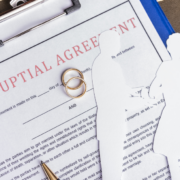Things to consider when selling your house during a divorce
When you sell your house during a divorce there are certain things that you should consider regarding equitable distribution:
1. Make sure that the house does not appear empty by removing the furniture. If buyers are aware you are going through a divorce, they may try to offer you less than your house is really worth. If possible, leave the furniture and photos on the walls. You can do a stipulation with your spouse on who gets what when you do sell and if you are not going to be living in the house you may want to get that done before you leave.
2. You may not agree with your spouse on the listing price or realtor. It is best to communicate with your spouse rather than have the court make these decisions for you. If you cannot agree on a realtor, one option the court likes is to submit three names to the court each and they will decide or you could do this between attorneys or a mediator. If you cannot agree on a listing price, you may want to defer to the realtor. You also may want to build in an agreement on dropping the price after a certain time has passed and how much you agree to drop it.
3. Keep receipts for repairs and always exchange estimates. If you make repairs to your house and you are getting divorced, you want to be sure to get credit for the repairs and reimbursed from the proceeds of the sale of the house. In order to do this, you need to make sure the repairs are necessary and agreed to before you pay for them. A good idea would be for each spouse to get estimates and agree in advance before the work is done as to what is getting reimbursed.
4. You may have an uncooperative spouse who refuses to market the house or make it available. Remember in a divorce that the Court can control and enforce the sale of the house and remedies against an uncooperative spouse could include giving Power of Attorney to one side only to control the sale, or even in some cases, eviction from the house of an uncooperative spouse.
5. You need to consider who will pay the mortgage, expenses and taxes while the house is up for sale. If the house is occupied, normally, the spouse who remains in the house is responsible for everything and this is not something reimbursed. If the house is unoccupied, these expenses can be imposed on both parties and you will want to keep receipts for everything to seek a credit in equitable distribution.
6. Make sure you have an agreement in place on disbursement of the proceeds when the sale is completed.
7. Remember if you work together with your spouse it will benefit both of you in getting the highest dollar value for your home and save you unnecessary legal fees.



